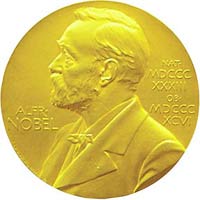Fert and Gruenberg win the 2007 Nobel Prize in physics for their discovery of giant magnetoresistance
France's Albert Fert and German Peter Gruenberg won the 2007 Nobel Prize in physics on Tuesday for their discovery of giant magnetoresistance, the process that has enabled billions of computer users to quickly and easily store reams of data on computer hard drives.

The technique, also known as GMR, "can also be considered one of the first real applications of the promising field of nanotechnology," the Royal Swedish Academy of Sciences said in its citation.
Last year, Americans John C. Mather and George F. Smoot won for their work examining the infancy of the universe, studies that have aided the understanding of galaxies and stars and increasing support for the Big Bang theory of the beginning of the universe.
On Monday, two American scientists, Mario R. Capecchi and Oliver Smithies, and Briton Sir Martin J. Evans, won the 2007 Nobel Prize in medicine for groundbreaking discoveries that led to a powerful technique for manipulating mouse genes.
Prizes for chemistry, literature, peace and economics will be announced through Oct. 15.
The peace award is announced in Oslo, while the other prizes are announced in Stockholm. The prizes, each of which carries a cash prize of 10 million Swedish kronor, or about US$1.5 million (EUR1.06 million), were established in the will of Swedish industrialist Alfred Nobel.
The Nobel prizes are always presented to the winners on the Dec. 10 anniversary of the death of its creator.
Subscribe to Pravda.Ru Telegram channel, Facebook, RSS!


